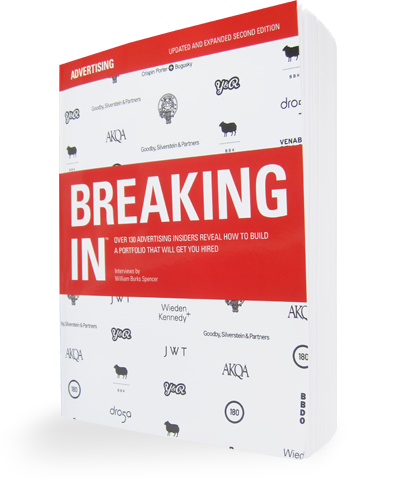Check out the work of Paul Catmur.
What do you look for in a student or junior portfolio? And what impresses you?
I look for work I wish I had done. I look for work that shows a creative maturity. It’s not just copying the latest scamps from Cannes. It’s work that’s actually designed to look at problems in a different way and probably sell a product or to change people—whatever the brief calls for.
Can you think of any portfolios that have done those things?
I did see a portfolio a couple years ago that stood out from all the others and that I thought was exceptional. But, in talking to the team, I didn’t think that they were exceptional. I thought that they had the wrong attitude. I would rather have people with the right attitude who aren’t brilliant than brilliant people with the wrong attitude. It’s not just about the book; it’s about the people.
[ … ]
Do you recommend that students write their own briefs and make their own strategies or can they find briefs?
I think that creative teams these days need to be generous. The best and smartest teams will write the strategy on their own. To me a lot of planners would be creatives if they had whatever difference it is — maybe it comes down to hard work sometimes. You need to be really smart to be a planner, but you have to work really hard to be a creative — probably harder than planners. I’ll get in trouble for that.
Are there common mistakes that students make?
Some agencies like to see scamps. They like to see ambient rubbish that is designed to appeal to the 10 members of an award jury and not to change the thoughts of members of the public. But it depends which agency you go to. If you come here, personally, I’m not interested in them — I think they’re a waste of time.
[ … ]
And there are some people who will say, “I only want to work at such-and-such agency,” and maybe there are people brilliant enough to pick and choose which agency they want to work for but I haven’t found that very often. Generally I find you need to get into the industry and do some work and then take a long-term view if there is a particular agency where you want to work. It’s a lot easier to move around from inside the industry than outside it, I think.
[ … ]
And what about writing? Do you need to see long copy?
Writing is writing. I think if you can write interestingly in any form—be it a film script, be it articles, be it a diary, be it a letter complaining about something—if you can write well you can write well. It’s a very tricky one because that can, to a certain extent, be taught. I didn’t start in advertising until I was 30, and I had forgotten to write properly between leaving school and going to advertising college in London. I had to learn it again. Inspired writing comes, to a certain extent, from inside, but not every piece of communication needs inspired writing because inspired thinking can make up for that.
Most long-copy ads in student books are incredibly dull. Copywriting doesn’t mean you can write a lot of words. Sometimes it means you can write three words but they’re very, very good.
[ … ]
Which brings me to my next point: when I started, all the students used to do the world’s strongest glue or the world’s fastest running shoe or the world’s longest-lasting battery. Stop it. You don’t get those briefs. The Asian award shows are full of that kind of thing, but it won’t get you a job at any decent agency. It might, but it shouldn’t.
[ … ]
I think your book has to show evidence of everything. The days when you could have a collection of campaigns of three print ads with the odd TV or possibly radio are over. It doesn’t cut it anymore. We name beers. We design beers. We think up the whole concept.


Comments are closed.